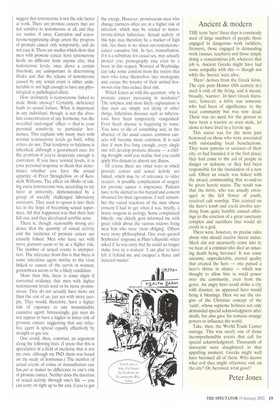Ancient & modern
THE term 'hero' these days is commonly used of large numbers of people: those engaged in dangerous work (soldiers, firemen), those engaged in demanding work (nurses, teachers) and those simply doing a conscientious job, whatever that job is. Ancient Greeks might have had some sympathy with this — though not while the 'heroes' were alive.
'Hero' derives from the Greek herds. The epic poet Homer (8th century BC) used it only of the living, and it meant. broadly, 'warrior'. In later Greek literature, however, a herds was someone who had been of significance to the local community but was now dead. There was no need for the person to have been a warrior or even male, let alone to have lived in a heroic age.
This status was for the most part bestowed on those who were associated with outstanding local benefactions. • They were patrons or saviours of their city, Or had founded it in the first place; they had come to the aid of people in danger or sickness; or they had been responsible for the foundation of a new cult. Often an oracle was linked with the award, commanding that so-and-so be given heroic status. The result was that the herds, who was usually envisaged in the full flower of youth, received cult worship. This centred on the hero's tomb and could involve anything from quite humble annual offerings to the erection of a great sanctuary complex and sacrifices that would do credit to a god.
There were, however, no precise rules about who should receive heroic status. Merit did not necessarily come into it; we hear of a criminal who died an amazing death being heroised. It was some uncanny, unpredictable, eternal quality that created the hero — one passed a hero's shrine in silence — which was thought to allow him to wield power over the community, even from the grave. An angry hero could strike a city with disaster; an appeased hero would bring it blessings. Here we see the origins of the Christian concept of the 'saint', whose supreme holiness not only demanded special acknowledgment after death, but also gave his remains strange powers to influence the world.
Take, then, the World Trade Center outrage. This was surely one of those incomprehensible events that call for special acknowledgment. Thousands of innocents were slaughtered in that appalling moment. Greeks might well have heroised all of them. Who knows what evil they might otherwise visit on the city? Or, heroised, what good?
Peter Jones






























































 Previous page
Previous page